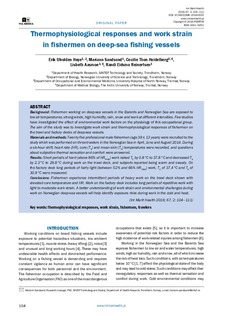| dc.description.abstract | Background: Fishermen working on deep-sea vessels in the Barents and Norwegian Sea are exposed to low air temperatures, strong winds, high humidity, rain, snow and work at different intensities. Few studies have investigated the effect of environmental work factors on the physiology of this occupational group. The aim of the study was to investigate work strain and thermophysiological responses of fishermen on the trawl and factory decks of deep-sea vessels. Materials and methods: Twenty-five professional male fishermen (age 39 ± 13 years) were recruited to the study which was performed on three trawlers in the Norwegian Sea in April, June and August 2014. During a six-hour shift, heart rate (HR), core (Tc) and mean skin (Ts) temperatures were recorded, and questions about subjective thermal sensation and comfort were answered. Results: Short periods of hard (above 86% of HRmax) work raised Tc by 0.8°C to 37.8°C and decreased Ts by 2.3°C to 29.8°C during work on the trawl deck, and subjects reported being warm and sweaty. On the factory deck long periods of fairly light (between 52% and 66% HRmax) work, Tc of 37.4°C and Ts of 30.9°C were measured. Conclusions: Fishermen experience intermittent periods of heavy work on the trawl deck shown with elevated core temperature and HR. Work on the factory deck includes long periods of repetitive work with light to moderate work strain. A better understanding of work strain and environmental challenges during work on Norwegian deep-sea vessels will help identify exposure risks during work in the cold and heat. | nb_NO |
